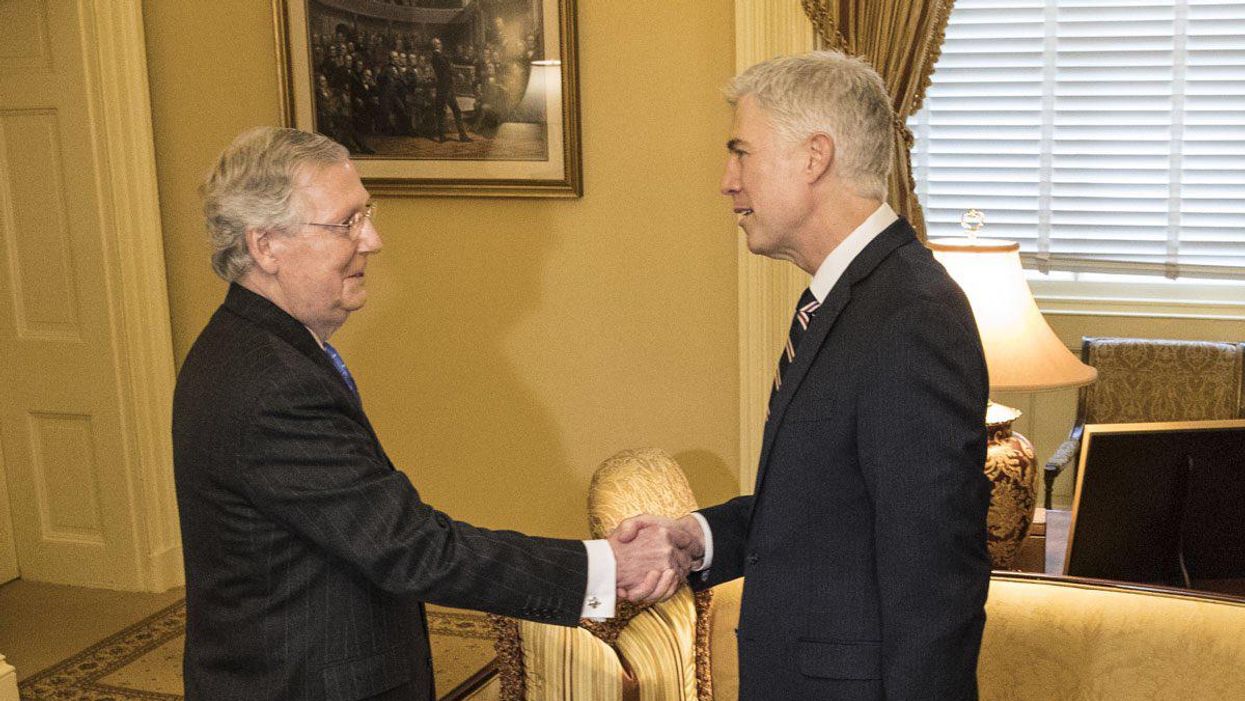Right-wing federal judges have grown increasingly hostile to voting rights: report

Neil Gorsuch with Sen. Mitch McConnell in 2017, Wikimedia Commons
February 25, 2022 | 10:37AM ETBank
Although considerable animosity now exists between former President Donald Trump and Senate Minority Leader Mitch McConnell, both of them helped bring an abundance of right-wing judges to the federal judiciary — not only the three U.S. Supreme Court justices that Trump nominated and appointed (Brett Kavanaugh, Neil Gorsuch and Amy Coney Barrett), but also, lower federal court judges. Trump nominated them; McConnell signed off on them.
Now, with voting rights under attack by far-right MAGA Republicans all over the United States, voter suppression has plenty of allies in the federal judiciary. National Public Radio reporter Carrie Johnson takes a look at their actions in an article published by NPR’s website on February 25.
U.S. judges are narrowing voting protections. Some fear lasting damagehttps://www.npr.org/2022/02/25/1082626791/u-s-judges-are-narrowing-voting-protections-some-fear-lasting-damage?utm_source=dlvr.it&utm_medium=twitter\u00a0\u2026— NPR Politics (@NPR Politics) 1645783352
“The nation's premier tool to protect voting rights is in mortal danger, threatened on multiple fronts by the Supreme Court and lower-ranking federal judges, scholars and civil rights advocates say,” Johnson reports. “The latest blow to the landmark Voting Rights Act of 1965 came this week in Arkansas, where a federal judge appointed by former President Donald Trump dismissed a case over new statehouse maps. The NAACP and the American Civil Liberties Union argued that the maps diluted the power of Black voters. But the judge, (Lee Rudofsky), said he found no way for the outside advocates to proceed.”
The ACLU has vowed to appeal Rudofsky’s ruling.
Sophia Lin Lakin, deputy director of the ACLU’s Voting Rights Project, told NPR, “This ruling was so radical that there was no choice but to appeal. Private individuals have brought cases under Section 2 of the Voting Rights Act to protect their right to vote for generations.”
Johnson notes that Gorsuch, in a different case, “expressed doubts about private rights to sue” under the Voting Rights Act of 1965. And Guy-Uriel Charles, a Harvard Law School professor, told NPR, “They are teeing up statutory and constitutional questions for the Court with the justifiable belief that the Court will welcome the narrow interpretation and the opportunity to further narrow the statute.”
Charles isn’t optimistic where the Supreme Court and voting rights are concerned.
The Harvard professor told NPR, “I would be very surprised if the Court does not interpret the statute in such a way as to take away the authority of states to draw majority-minority districts under the (Voting Rights) Act, except in cases in which the states have engaged in blatantly clear racial discrimination.”